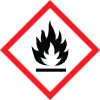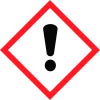Interflon Lube TF (Aerosol)
Interflon BV
Revision date : 2021-03-24


Note: Ingredients listed on restricted chemical lists
EC/CAS
64742-48-9
Name of the chemical
Naphtha (petroleum), hydrotreated heavy
Concentration
N/A
EC/CAS
64742-54-7
Name of the chemical
Distillates (petroleum), hydrotreated heavy paraffinic
Concentration
N/A
EC/CAS
265-157-1
Name of the chemical
Distillates (petroleum), hydrotreated heavy paraffinic
Concentration
N/A
General Information
Revision date
2021-03-24
Product name
Interflon Lube TF (Aerosol)
REACH No
not
1.2.1 Relevant identified uses
lubricant
Icons in SDS
Company Information
Company name
Interflon BV
E-mail address of the competent person responsible for the Safety Data Sheet
Service@interflon.com, Service@interflon.com
GHS Information
Signal word
Danger
Hazard Codes
Hazard statements (CLP)
H222, H229, H317, H319, H412
Hazard statements
Code
Statements
H222
Extremely flammable aerosol
H229
Pressurized container: may burst if heated
H317
May cause an allergic skin reaction
H319
Causes serious eye irritation
H412
Harmful to aquatic life with long lasting effects
Precautionary statements
Code
Statements
P210
Keep away from heat, hot surface, sparks, open flames and other ignition sources. - No smoking.
P211
Do not spray on an open flame or other ignition source.
P251
Do not pierce or burn, even after use.
P261
Avoid breathing dust/fume/gas/mist/vapors/spray.
P273
Avoid release to the environment.
P280
Wear protective gloves/protective clothing/eye protection/face protection.
P333+P313
IF SKIN irritation or rash occurs: Get medical advice/attention.
P337+P313
IF eye irritation persists: Get medical advice/attention.
P362+P364
Take off contaminated clothing and wash it before reuse.
P410+P412
Protect from sunlight. Do not expose to temperatures exceeding 50 °C/122°F.
P501
Dispose of contents/container to ...
EUH-statements
Code
Statements
EUH066
Repeated exposure may cause skin dryness or cracking
Section 2
CLP CLASSIFICATION
Section
Hazard categories
Category Hazard state ment 2.3 aerosols 1 Aerosol 1 H222,H229 3.3 serious eye damage/eye irritation 2 Eye Irrit. 2 H319 3.4S skin sensitisation 1B Skin Sens. 1B H317 4.1C hazardous to the aquatic environment - chronic hazard 3 Aquatic Chronic 3 H412 For full text of abbreviations: see SECTION 16.
Most important adverse effects
Spillage and fire water can cause pollution of watercourses.
2.2 Label elements
Labelling according to Regulation (EC) No 1272/2008 (CLP)
Signal word
danger
Hazard pictograms
GHS02, GHS07
Hazard statements
H222 Extremely flammable aerosol. H229 Pressurised container: May burst if heated. H317 May cause an allergic skin reaction. H319 Causes serious eye irritation. H412 Harmful to aquatic life with long lasting effects.
Precautionary statements
P210 Keep away from heat, hot surfaces, sparks, open flames and other ignition sources. No smoking. P211 Do not spray on an open flame or other ignition source. P251 Do not pierce or burn, even after use. P261 Avoid breathing dust/fume/gas/mist/vapours/spray. P273 Avoid release to the environment. P280 Wear protective gloves/protective clothing/eye protection/face protection. P333+P313 If skin irritation or rash occurs: Get medical advice/attention. P337+P313 If eye irritation persists: Get medical advice/attention. P362+P364 Take off contaminated clothing and wash it before reuse. P410+P412 Protect from sunlight. Do not expose to temperatures exceeding 50 °C/122 °F. P501 Dispose of contents/container to industrial combustion plant.
Supplemental label elements
EUH066 Repeated exposure may cause skin dryness or cracking. Additional labelling according to Directive 75/324/EEC relating to aerosol dispensers Extremely flammable. Pressurized container: may burst if heated. Keep away from heat, hot surfaces, sparks, open flames and other ignition sources. No smoking. Do not pierce or burn, even after use. Protect from sunlight. Do not expose to temperatures exceeding 50 °C/122 °F.
Hazardous Ingredients
Amines, C10-14-tert-alkyl
2.3 Other hazards
of no significance

